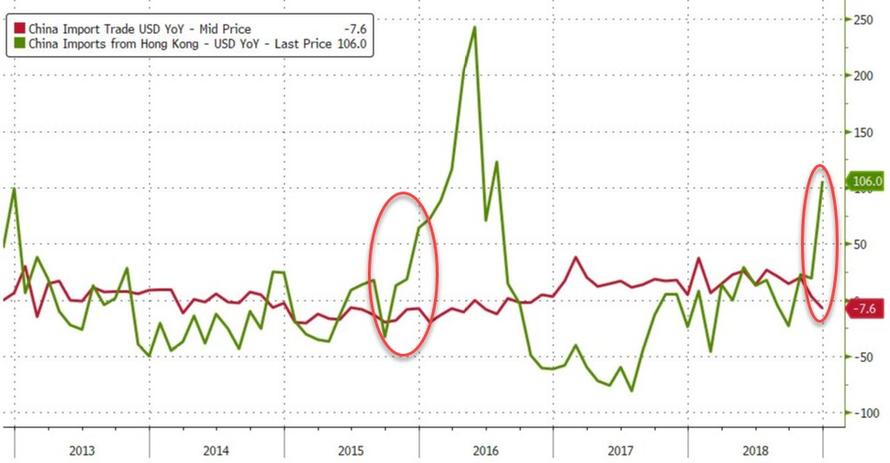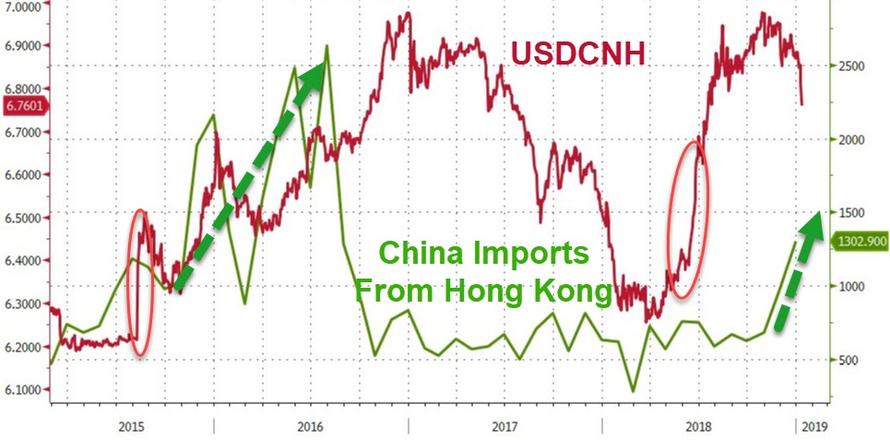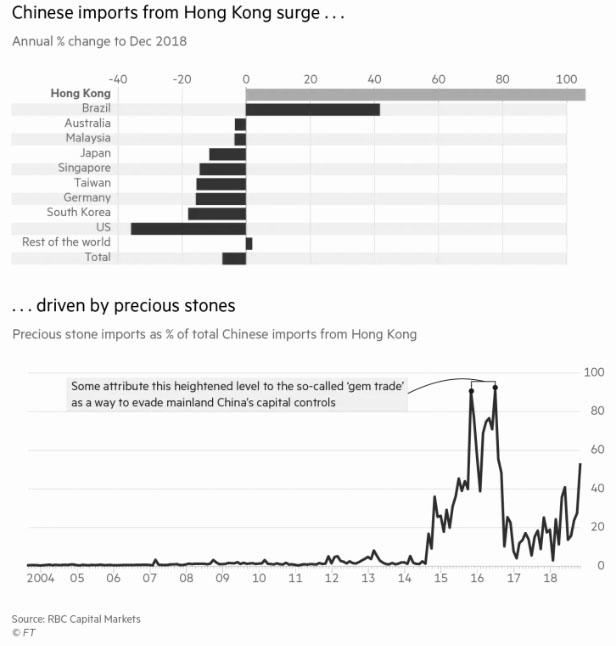中国資金がまた海外流出しつつある・・どういう言う方法かも分かっている
ガラス玉を何億円かの宝石だと主張することもできますからね。
Officially, China has maintained quasi capital controls for years:
on paper no individual is allowed to move more than $50,000 out of the
country in any given year while Chinese companies can exchange yuan for
foreign currencies only for approved purposes.
公式には、中国は長年、準資本規制を行ってきた:書類の上では、だれも年間$50,000以上の資金を海外に持ち出すことはできない、一方で中国企業は政府認可のもとで人民元を外貨に変えることができる。
Unofficially, China's capital controls had been skirted for years, leading to massive capital outflow from the nation over the past decade, leading to such aberrations as massive luxury housing bubbles in places such as Vancouver, London, New York and San Francisco, and seemingly middle-class Chinese politicians and oligarchs sporting Swiss bank accounts funded in the hundreds of millions (or billions).
非公式には、中国の資本規制は長年回避されてきた、この10年巨額の資金が海外流出してきた、これが常軌を逸した巨大な高級住宅バブルを各地で引き起こした、バンクーバー、ロンドン、ニューヨークそしてサンフランシスコ、そして中国の政治家たちはスイスの銀行口座に数百M(もしくは数百B)の資金を隠しているとみられる。(訳注:パナマ文書で習近平の義理の弟名義の何千億円の海外資金も明らかになっています。当然中国国内で報道されることはありませんが。)
In fact, as we detailed in 2017, Beijing has an interesting way of dealing with capital outflows. While they closely monitor many methods, they don’t actively pursue shutting them down. They often watch from afar, and if capital reserves aren’t impacted, or their reputation isn’t damaged, they allow them to continue. The PBoC announced in 2017 they were going to deploy a massive anti-money laundering framework, designed to further halt capital outflows. As we said at the time, we’ll have to see if they were serious, or if this was just to win reputation points with international countries.
実際、ZeroHedgeが2017年に明らかにしたが、北京政府も資本流出に対処する方法を持っている。彼らは多くの手法を注意深く監視しているが、積極的にそれらの手法を禁じることはない。彼らは高みの見物であり、外貨準備に影響がない限り、もしくは北京政府の評判が悪くならない限り、それを放置している。2017年に、PBoCは巨大なアンチマネーロンダリングフレームワーク展開をしようとしているとアナウンスした、さらなる資本流出を止めようとしたのだ。当時ZeroHedgeはこう言った、果たして彼らが真剣なのか、それとも国際社会の評判を気にしているだけのか、見極めねば。
Well, two years later, we may have the answer. After an apparent lull in outflows, potentially driven by the reforms cracking down on capital flight, there are signs that China is facing an exodus of cash once again.
それから二年が経ち、我々はその答えを得たかもしれない。資金逃避の厳しい取り締まりで資金流出が沈静化した後、いま中国は再び資金流出に直面している。
As we first reported two weeks ago, amid all the headlines about China's surplus with US and the ongoing trade tensions, there was a message hidden in China's trade data, namely that capital outflow probably accelerated significantly last month. It's a reminder of why the PBOC would probably be reluctant to let the yuan decline significantly. That would encourage even further outflows and risk a vicious circle. While China's total imports plunged 7.6% in dollar terms from a year earlier, its purchases from Hong Kong surged 106%.
ZeroHedgeが二週前に報告したが、中国の対米貿易黒字と現在進行中の貿易係争のなかで、中国の貿易データには隠されたものが在った、すなわち先月資金流出が極端に加速した。どうしてPBOCは人民元の大幅下落をどうして望まないかを思い起こしてほしい。これが起きるとさらなる資金流出を引き起こし負のサイクルを引き起こすリスクがある。この一年で中国の全輸入は7.6%減少したが、香港からの輸入は106%も急増した。

Only... they didn't, as this has traditionally been the way to "book-keep" China's capital outflows, meaning there isn't really a surge in Hong Kong exports but rather just Chinese importers laundering money by pretending to overpay for Hong Kong exports.
そうは起きないことだ、この出来事は「帳簿上」中国の資金流出を引き起こすよく知られた手法だ、この意味することは、実際には香港の輸出が急増したわけではなくむしろ中国の輸入業者が香港の輸出業者に過剰な支払いをしてマネーロンダリングをしたのだ。
Elsa Lignos, global head of FX Strategy at RBC in London, wrote recently that this outlier resembles the jump in 2015-2016 when mainland companies used inflated invoices to take money out of the country. The timing of the sudden shift is telling as it coincides with a lagged reaction to a sudden devaluation - just as we saw in 2015/2016.
Elsa Lignos,ロンドンRBCのFX戦略世界責任者、が最近書いたが、この特異な出来事は2015−2016に中国本土企業が水増し請求書を利用して資金を国外に持ち出したときに似ている。この貿易統計が急変するということはそのしばらく後に人民元の減価が待ち構えているーー2015/2016に見たとおりだ。

Now two weeks later, with more detailed information available, we know just how this massive Chinese capital flight is taking place: the answer: precious stones.
As noted China skeptic Kyle Bass noted yesterday, "wealthy Chinese are running again - precious stones — diamonds, sapphires, etc were 53% China’s total imports from Hong Kong in Nov(up from 2.9% early 2018)." Yet at the same time, the actual sales of jewelry(watches, clocks, and gifts) were down 3.9% in HK same period, or as Bass notes, just like in the period before the 2015 devaluation.
それから2週たち、もっと詳細な情報が得られた、ZeroHedgeの知るところとなった、どのようにに巨額の中国資金逃避が起きているかということをだ:その手法は:宝石。中国を疑問視しているKyle Bassが昨日書いたことだが、「中国富裕層がまた動き始めているーー宝石ーー11月の香港からの輸入のうち53%がダイアモンド、サファイア等なのだ(2018年初めには2.9%でしかなかった)。ただ同じ時期に香港での宝飾品(腕時計、壁掛け時計、贈り物)の実売上は3.9%下落している、Bassが書いているように、2015年の減価前の時期とそっくりだ。
Bassは先程のRBS fxストラテジストの追伸記事について言及している、Elsa Lignosは最近の香港から中国への「輸入」急増についてだけでなく、香港から中国への宝石輸入急増を指摘している。
"In November, for example, precious stones — diamonds, sapphires,
opals and the like — accounted for 53 per cent of China’s total imports
from Hong Kong, up from a low of just 2.9 per cent last February", she
noted according to the FT. Yet at the same time, as Kyle Bass pointed
out above, analysts at Jefferies noted that sales of jewellery, watches, clocks and valuable gifts were down 3.9 per cent in Hong Kong in November. That
was led by “slower consumption of big-ticket gem-set jewellery” in a
market where mainland customers account for about three-quarters of
sales.
「たとえば11月には、宝石ーーダイアモンド、サファイア、オパール等々ーーこれが香港から中国への輸入の53%になる、この2月のわずか2.9%から大きく増えている、FTによると彼女はこう主張する。同時に、Kyle Bassが上に指摘したように、Jefferiesのアナリストはこう指摘する、腕時計、壁掛け時計、高価な贈り物の11月香港での売上は3.9%減っている。この原因は「値札の高い宝飾品売上が鈍化」しているのだ、中国本土からの顧客のQ3売上に関してだ。

As the FT concludes, correctly, "if some mainlanders are again using the notoriously opaque gem trade to evade capital controls and transfer assets out of China" - which they are - "this may be an ominous sign for the direction of the Chinese currency, and by extension, the economy."
FTの結論はこうだ、正確に言うと、「もし中国本土中国人が再び悪名高い偽宝石売買で資本規制を回避し中国本土から資金を流出しているなら」ーーその意味するところはーー「これは人民元の動向を示す不吉なサインかもしれない、そして拡大解釈すると経済動向を予兆させるものだ」。
The flipside is that at least we know China's depositors are not using Bitcoin to transfer their money offshore... yet.
この出来事を見ると、少なくとも、中国人は資金を海外に持ち出すのにBitcoinを使っていないとを我々は分かっている・・・。
As for what happens next, Bloomberg's Ye Xie points out that as the yuan has appreciated this year, "it would be safe to assume that the urgency for local residents and companies to skirt capital controls and move money out has diminished somewhat." If that is indeed the case, imports from Hong Kong should retreat a bit. However, if China's "imports of precious stones" from Hong Kong accelerate in the months ahead, it will confirm that capital outflow pressure remains persistent and the yuan's strong performance this month will be short-lived; worse it would suggest that at least according to China's local population, another devaluation of the yuan may be imminent.
次に起きることに関し、ブルームバーグのYe Xieはこう指摘する、今年は人民元が好まれた、「現地の人たちや企業が資本制御を回避して急いで資金を逃がすほどではなかった。」もし確かにそうなら、香港からの輸入は少し減少するはずだ。しかしながら、もし中国人による香港からの「宝石輸入」が今後数ヶ月加速して増えるなら、資金逃避圧力は続き人民元の今月の強いパフォーマンスは短命だろう;現地の中国人からの情報によると悪い示唆がある、さらなる人民元の減価が差し迫っている。
公式には、中国は長年、準資本規制を行ってきた:書類の上では、だれも年間$50,000以上の資金を海外に持ち出すことはできない、一方で中国企業は政府認可のもとで人民元を外貨に変えることができる。
Unofficially, China's capital controls had been skirted for years, leading to massive capital outflow from the nation over the past decade, leading to such aberrations as massive luxury housing bubbles in places such as Vancouver, London, New York and San Francisco, and seemingly middle-class Chinese politicians and oligarchs sporting Swiss bank accounts funded in the hundreds of millions (or billions).
非公式には、中国の資本規制は長年回避されてきた、この10年巨額の資金が海外流出してきた、これが常軌を逸した巨大な高級住宅バブルを各地で引き起こした、バンクーバー、ロンドン、ニューヨークそしてサンフランシスコ、そして中国の政治家たちはスイスの銀行口座に数百M(もしくは数百B)の資金を隠しているとみられる。(訳注:パナマ文書で習近平の義理の弟名義の何千億円の海外資金も明らかになっています。当然中国国内で報道されることはありませんが。)
In fact, as we detailed in 2017, Beijing has an interesting way of dealing with capital outflows. While they closely monitor many methods, they don’t actively pursue shutting them down. They often watch from afar, and if capital reserves aren’t impacted, or their reputation isn’t damaged, they allow them to continue. The PBoC announced in 2017 they were going to deploy a massive anti-money laundering framework, designed to further halt capital outflows. As we said at the time, we’ll have to see if they were serious, or if this was just to win reputation points with international countries.
実際、ZeroHedgeが2017年に明らかにしたが、北京政府も資本流出に対処する方法を持っている。彼らは多くの手法を注意深く監視しているが、積極的にそれらの手法を禁じることはない。彼らは高みの見物であり、外貨準備に影響がない限り、もしくは北京政府の評判が悪くならない限り、それを放置している。2017年に、PBoCは巨大なアンチマネーロンダリングフレームワーク展開をしようとしているとアナウンスした、さらなる資本流出を止めようとしたのだ。当時ZeroHedgeはこう言った、果たして彼らが真剣なのか、それとも国際社会の評判を気にしているだけのか、見極めねば。
Well, two years later, we may have the answer. After an apparent lull in outflows, potentially driven by the reforms cracking down on capital flight, there are signs that China is facing an exodus of cash once again.
それから二年が経ち、我々はその答えを得たかもしれない。資金逃避の厳しい取り締まりで資金流出が沈静化した後、いま中国は再び資金流出に直面している。
As we first reported two weeks ago, amid all the headlines about China's surplus with US and the ongoing trade tensions, there was a message hidden in China's trade data, namely that capital outflow probably accelerated significantly last month. It's a reminder of why the PBOC would probably be reluctant to let the yuan decline significantly. That would encourage even further outflows and risk a vicious circle. While China's total imports plunged 7.6% in dollar terms from a year earlier, its purchases from Hong Kong surged 106%.
ZeroHedgeが二週前に報告したが、中国の対米貿易黒字と現在進行中の貿易係争のなかで、中国の貿易データには隠されたものが在った、すなわち先月資金流出が極端に加速した。どうしてPBOCは人民元の大幅下落をどうして望まないかを思い起こしてほしい。これが起きるとさらなる資金流出を引き起こし負のサイクルを引き起こすリスクがある。この一年で中国の全輸入は7.6%減少したが、香港からの輸入は106%も急増した。

Only... they didn't, as this has traditionally been the way to "book-keep" China's capital outflows, meaning there isn't really a surge in Hong Kong exports but rather just Chinese importers laundering money by pretending to overpay for Hong Kong exports.
そうは起きないことだ、この出来事は「帳簿上」中国の資金流出を引き起こすよく知られた手法だ、この意味することは、実際には香港の輸出が急増したわけではなくむしろ中国の輸入業者が香港の輸出業者に過剰な支払いをしてマネーロンダリングをしたのだ。
Elsa Lignos, global head of FX Strategy at RBC in London, wrote recently that this outlier resembles the jump in 2015-2016 when mainland companies used inflated invoices to take money out of the country. The timing of the sudden shift is telling as it coincides with a lagged reaction to a sudden devaluation - just as we saw in 2015/2016.
Elsa Lignos,ロンドンRBCのFX戦略世界責任者、が最近書いたが、この特異な出来事は2015−2016に中国本土企業が水増し請求書を利用して資金を国外に持ち出したときに似ている。この貿易統計が急変するということはそのしばらく後に人民元の減価が待ち構えているーー2015/2016に見たとおりだ。

As noted China skeptic Kyle Bass noted yesterday, "wealthy Chinese are running again - precious stones — diamonds, sapphires, etc were 53% China’s total imports from Hong Kong in Nov(up from 2.9% early 2018)." Yet at the same time, the actual sales of jewelry(watches, clocks, and gifts) were down 3.9% in HK same period, or as Bass notes, just like in the period before the 2015 devaluation.
それから2週たち、もっと詳細な情報が得られた、ZeroHedgeの知るところとなった、どのようにに巨額の中国資金逃避が起きているかということをだ:その手法は:宝石。中国を疑問視しているKyle Bassが昨日書いたことだが、「中国富裕層がまた動き始めているーー宝石ーー11月の香港からの輸入のうち53%がダイアモンド、サファイア等なのだ(2018年初めには2.9%でしかなかった)。ただ同じ時期に香港での宝飾品(腕時計、壁掛け時計、贈り物)の実売上は3.9%下落している、Bassが書いているように、2015年の減価前の時期とそっくりだ。
Bassは先程のRBS fxストラテジストの追伸記事について言及している、Elsa Lignosは最近の香港から中国への「輸入」急増についてだけでなく、香港から中国への宝石輸入急増を指摘している。
「たとえば11月には、宝石ーーダイアモンド、サファイア、オパール等々ーーこれが香港から中国への輸入の53%になる、この2月のわずか2.9%から大きく増えている、FTによると彼女はこう主張する。同時に、Kyle Bassが上に指摘したように、Jefferiesのアナリストはこう指摘する、腕時計、壁掛け時計、高価な贈り物の11月香港での売上は3.9%減っている。この原因は「値札の高い宝飾品売上が鈍化」しているのだ、中国本土からの顧客のQ3売上に関してだ。

As the FT concludes, correctly, "if some mainlanders are again using the notoriously opaque gem trade to evade capital controls and transfer assets out of China" - which they are - "this may be an ominous sign for the direction of the Chinese currency, and by extension, the economy."
FTの結論はこうだ、正確に言うと、「もし中国本土中国人が再び悪名高い偽宝石売買で資本規制を回避し中国本土から資金を流出しているなら」ーーその意味するところはーー「これは人民元の動向を示す不吉なサインかもしれない、そして拡大解釈すると経済動向を予兆させるものだ」。
The flipside is that at least we know China's depositors are not using Bitcoin to transfer their money offshore... yet.
この出来事を見ると、少なくとも、中国人は資金を海外に持ち出すのにBitcoinを使っていないとを我々は分かっている・・・。
As for what happens next, Bloomberg's Ye Xie points out that as the yuan has appreciated this year, "it would be safe to assume that the urgency for local residents and companies to skirt capital controls and move money out has diminished somewhat." If that is indeed the case, imports from Hong Kong should retreat a bit. However, if China's "imports of precious stones" from Hong Kong accelerate in the months ahead, it will confirm that capital outflow pressure remains persistent and the yuan's strong performance this month will be short-lived; worse it would suggest that at least according to China's local population, another devaluation of the yuan may be imminent.
次に起きることに関し、ブルームバーグのYe Xieはこう指摘する、今年は人民元が好まれた、「現地の人たちや企業が資本制御を回避して急いで資金を逃がすほどではなかった。」もし確かにそうなら、香港からの輸入は少し減少するはずだ。しかしながら、もし中国人による香港からの「宝石輸入」が今後数ヶ月加速して増えるなら、資金逃避圧力は続き人民元の今月の強いパフォーマンスは短命だろう;現地の中国人からの情報によると悪い示唆がある、さらなる人民元の減価が差し迫っている。




